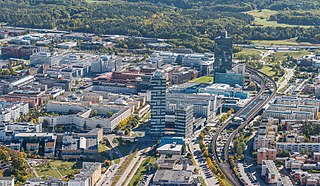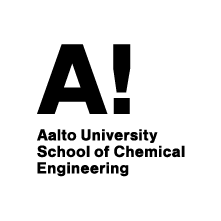
Chalmers University of Technology is a Swedish university located in Gothenburg that conducts research and education in technology and natural sciences at a high international level. The university has approximately 3100 employees and 10,000 students, and offers education in engineering, science, shipping, architecture and other management areas. Chalmers is coordinating the Graphene Flagship, the European Union's biggest research initiative to bring graphene innovation out of the lab and into commercial applications, and leading the development of a Swedish quantum computer.

Kista is a district in the borough of Rinkeby-Kista, Stockholm, Sweden. It has a strategic position located in between Sweden's main airport, the Stockholm-Arlanda International Airport and central Stockholm, and alongside the main national highway E4 economic artery. Kista comprises residential and commercial areas, the latter in the highly technological telecommunication and information technology industry. There are large research efforts in this entire area, which therefore is dubbed Kista Science City. It is the research park of KTH Royal Institute of Technology.

Alfa Laval AB is a Swedish company, founded in 1883 by Gustaf de Laval and Oscar Lamm. The company, which started in providing centrifugal separation solutions for dairy, now deals in the production of specialised products and solutions for heavy industry. The products are used to heat, cool, separate and transport such products as oil, water, chemicals, beverages, foodstuffs, starch and pharmaceuticals.

Värnamo, historically known as Wernamo, is a town in Jönköping County in the south of Sweden. It is situated on the river Lagan just north of the lake Vidöstern. It is the seat of Värnamo Municipality and has 19,778 inhabitants as of 31 December 2020. The name comes from old Swedish värn (sconce) and mo.

Forschungszentrum Jülich is a national research institution that pursues interdisciplinary research in the fields of energy, information, and bioeconomy. It operates research infrastructures with a focus on supercomputers. Current research priorities include the structural change in the Rhineland lignite-mining region, hydrogen, and quantum technologies. As a member of the Helmholtz Association with roughly 6,800 employees in ten institutes and 80 subinstitutes, Jülich is one of the largest research institutions in Europe.

Tietoevry Oyj, Tietoevry Corporation, is a Finnish IT software and service company providing IT and product engineering services. Tietoevry is domiciled in Espoo, Finland, and the company's shares are listed on the NASDAQ OMX Helsinki, NASDAQ OMX Stockholm and Oslo Stock Exchange. Tietoevry has approximately 24,000 employees across 20 countries, and has customers in the energy, forestry, banking, and healthcare sectors.

Grundfos is the largest pump manufacturer in the world, based in Denmark, with more than 19,000 employees globally.

Preem is a Swedish petroleum and bio-fuel company with approximately 570 petrol stations and two oil refineries in Sweden, Preemraff Göteborg in Gothenburg and Preemraff Lysekil outside of Lysekil. Preem refines a total of just over 18 million tonnes of crude oil per year. The business cover a large part of the value chain - from the processing of raw materials to sales. Preem purchase crude oil and renewable raw materials from around the world.
RISE SICS is a leading research institute for applied information and communication technology in Sweden, founded in 1985.

Scandic Hotels is a hotel chain headquartered in Stockholm, Sweden, with its main operations in the Nordic countries. Alongside hotels in Sweden, Norway, Finland and Denmark, the company also has a presence in Germany and Poland. As of 31 December 2018, the company has 11,560 employees and operates 283 hotels with 51,693 guest rooms. The company has stated that is an ecologically sustainable business since 1994.
The European Federation of Biotechnology (EFB) was established by European scientists in 1978. It is a non-profit federation of national biotechnology associations, learned societies, universities, scientific institutes, biotechnology companies and individual biotechnologists working to promote biotechnology throughout Europe and beyond.

Aalto University School of Chemical Engineering is a part of the Aalto University and one of the four new schools of technology established from the former Aalto University School of Science and Technology on 1 January 2011. The new schools continue to offer education and research that promotes advances in science and technology.

Caverion is a Finnish listed company that designs, implements, and maintains building technology and industrial services. Its offering covers the entire life cycle of buildings, infrastructure, or industrial sites and processes: from design and build to projects, technical and industrial maintenance, facility management, and advisory services. The company has two business units: Services and Projects and has about 14,000 employees in 10 countries. Its shares are listed on the Nasdaq Helsinki
Swerea is a Swedish research group specialising in applied scientific research in materials development, production and product development. The group operates mainly in Sweden for industry with operations in Sweden, but also owns the Corrosion Institute in France. The Swerea group consists of five research institutes: Swerea IVF, Swerea KIMAB, Swerea MEFOS, Swerea SWECAST and Swerea SICOMP. Office locations were Kista (Stockholm), Luleå, Piteå, Mölndal (Göteborg), Jönköping, Linköping, Eskilstuna, Trollhättan, Oslo, St Etienne och Brest.
National Aeronautical Research Institute, was a former Swedish state governmental authority under the Ministry of Defence with the aim to conduct research, development and experimentation in the aeronautical field. The FFA was located in Ulvsunda industrial park in Bromma, Stockholm.

Lars Ivar Samuelson, is a Swedish physicist and professor in nanotechnology and Semiconductor electronics at Lund University.
Open access to scholarly communication in Sweden is relatively widespread. In 2010 the Swedish Research Council began requiring its grantees to make research results available in open access form. Lund University Libraries and Stockholm University Press belong to the international Open Access Scholarly Publishers Association.
Lars Anders Vilhelm Bern is a Swedish engineer, doctor of technology, author and debater.
The Swedish Transport Administration electric road program or Swedish Transport Administration Electrification Program is a program involving the assessment, planning, and implementation of an electric road national infrastructure for Sweden by Trafikverket, the Swedish Transport Administration.











